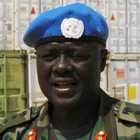Evidence vs Dogma in Darfur

After six years of violence, the war in Darfur is over, according to a man who should know. General Martin Luther Agwai was handed mission impossible two years ago – setting up the joint UN and AU peacekeeping job. In an interview with the BBC, as he prepares to step down as force commander, General Agwai said the conflict was very different to earlier phases of heavy fighting…
"Banditry, localised issues, people trying to resolve issues over water and land at a local level. But real war as such, I think we are over that," he said.
Anyone who has visited Darfur in the past couple of years has come to the same conclusion. Yet the Save Darfur lobby has predictably – accidentally or deliberately – misunderstood what General Agwai has said. Over at Enough, John Norris, who likes to accuse anyone who differs from his views as being a Khartoum sympathiser, deliberately misses the point…
What Agwai and others conveniently fail to mention: the three million Darfuris stuck in refugee and displaced camps unable to return to their homes because of insecurity and violence. Having driven three million people from their homes, President Bashir and his janjaweed allies do not need to engage in daily military clashes anymore because they have achieved their objectives.
This is not what General Agwai was saying. The man who has spent the past two years trying to protect the camps and keeping a lid on banditry, was actually saying Darfur was still mired in a humanitarian emergency, but that the insecurity was no longer the sort of genocide or military conflict that people like Norris like to imagine.
Over at The Promise of Engagement, Bec Hamilton, who has at least now been to Darfur, inadvertently misses the point.
Firstly, it’s hard to distinguish ‘the war is over’ from ‘the war is in temporary respite because of rains/fractured rebels/focus on the elections’. Secondly, even to the extent this is a permanent change, it’s still somewhat irrelevant from the perspective of the IDPs. The real issue is how insecurity (as a result of the war) has squeezed the humanitarian space.
I would disagree with little of that. But Bec charmingly then blows it…
Bottom line: I wouldn’t say Gen. Agwai’s comments are “wrong” but rather very much beside the point.
Regular readers of this blog won’t need me to say this again, but anyway, here goes. The whole problem with the international effort to save Darfur has been this sort of misguided analysis. How you understand the conflict in Darfur is central to devising the right solutions. To continue to believe that this is a genocide or a war means we will continue to focus on no-fly zones, peacekeepers and arresting President Bashir. This continues to be the mainstream view of the campaigners – as shown in the support offered to these options by Biden, Clinton and Obama in last year’s US presidential campaign.
The reality of course is very different. The crisis in Sudan’s western region is humanitarian, needing humanitarian not military solutions. As General Agwai’s analysis makes clear, banditry, water and local issues need to be tackled if Darfur is to find security. He has not missed the point. This is the point Bec.
Commentators who harp on about genocide and war in the face of evidence to the contrary are increasingly looking like sad, out-of-touch polemicists with a grudge. Rather than using the evidence to shape their analysis and their solutions, they are using their agenda to dictate the possible range of solutions. To dismiss General Agwai’s comments out of hand is clear evidence that they are not interested in understanding what is happening on the ground. People like Norris will only stop when they have brought down the government in Khartoum – whatever the implications for regional security.
Peace can only be achieved if the lobbyists drop their dogmatic stance. But some of the campaigners seem less interested in peace than pursuing an anti-Muslim agenda. That’s why we haven’t managed to save Darfur yet.
